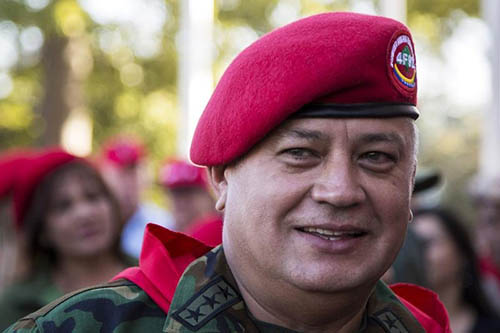Bogotá, May 15, 2015–The Committee to Protect Journalists condemns a decision by a Venezuelan judge that prohibits 22 news executives from three independent media outlets from leaving the country due to a defamation lawsuit filed by one of Venezuela’s most powerful politicians. According to news reports, the lawsuit and travel ban came after three outlets republished in January a story from the Spanish daily ABC that linked Diosdado Cabello, president of Venezuela’s National Assembly, to drug trafficking.
“These three media outlets and 22 executives are facing disproportionate reprisal for simply republishing content from a third party,” said Carlos Lauría, CPJ’s senior program coordinator for the Americas, from New York. “This court action flouts international norms on freedom of expression and represents a further attempt by one of the country’s most powerful politicians to hammer away at what little remains of the Venezuelan independent press.”
Those affected by the travel ban, issued by Caracas Judge María Eugenia Nuñez, include three of the country’s most prominent editors who are fiercely critical of Venezuela’s socialist government: Miguel Henrique Otero, editor of the Caracas daily El Nacional; Teodoro Petkoff, editor of the weekly Tal Cual newspaper; and Alberto Ravell, who runs the online news site La Patilla.
The ABC story, also published in January, cited testimony allegedly given to U.S. Justice Department officials by Cabello’s exiled former bodyguard, Leamsy Salazar, in which he supposedly named Cabello as the head of a drug-trafficking ring within the Venezuelan military called the Cartel of the Suns.
According to news reports, Cabello has confirmed that Salazar defected to the U.S. in December and may be cooperating with U.S. officials in a legal case that would name him as head of the drug ring. But he denies any ties to trafficking and announced in April that he had filed a lawsuit against El Nacional, Tal Cual, and La Patilla as well as ABC for criminal defamation.
Cabello said on his television program Wednesday night that he had asked the justice system to impose the travel ban. “They accused me of being a drug trafficker without any proof,” Cabello said. “I’ve requested … that they be prohibited from leaving the country.” He said that he was also seeking to prohibit these news executives from selling their assets.
Manuel Antonio Puyana Santander, director of Tal Cual and one of executives named in the suit, said that after fighting to gain access to the files in the case he had learned on Monday that the ban had been imposed on May 5, according to news reports.
Otero told Reuters that he and the other news executives had also been ordered to report to the court once a week. Otero spoke to the news agency from Miami, saying he left Venezuela before the ban came into effect. He said he planned to return to Caracas in a few days.
“This is part of a government strategy to silence independent journalism,” Otero told Reuters.
“We haven’t committed any crime. All we did was republish an article from ABC,” Ravell told the Colombian TV news station NTN24.
Xabier Coscojuela, news editor at Tal Cual, told CPJ that the travel ban includes three of the newspaper’s board members. Petkoff had already been banned from leaving the country due to an earlier defamation lawsuit filed by Cabello against Tal Cual.
Coscojuela said that he decided to reprint the controversial ABC article because the author, Washington-based correspondent Emili J. Blasco, has a track record of breaking big stories on Venezuela. He said Blasco correctly reported that former President Hugo Chávez was suffering from cancer long before the Venezuelan government confirmed the news.
Venezuela’s Communications Ministry, which deals with foreign press inquiries, did not respond to CPJ’s request for comment.
The government of President Nicolás Maduro has employed a number of tactics to weaken the few remaining critical media outlets in Venezuela, according to CPJ research. In recent years, independent outlets–such as the Globovisión TV station and El Universal newspaper–have been sold to business groups rumored to be on friendly terms with the government and, several Venezuelan journalists told CPJ last year, have toned down their coverage. Most TV and radio stations are either pro-government or rarely question official policies. In the past decade, Tal Cual has faced seven government lawsuits as well as tax investigations, Coscojuela told CPJ earlier this year. Meanwhile, a newsprint shortage due to currency controls has curtailed the ability of many newspapers to circulate and has forced others out of business, according to CPJ research.
